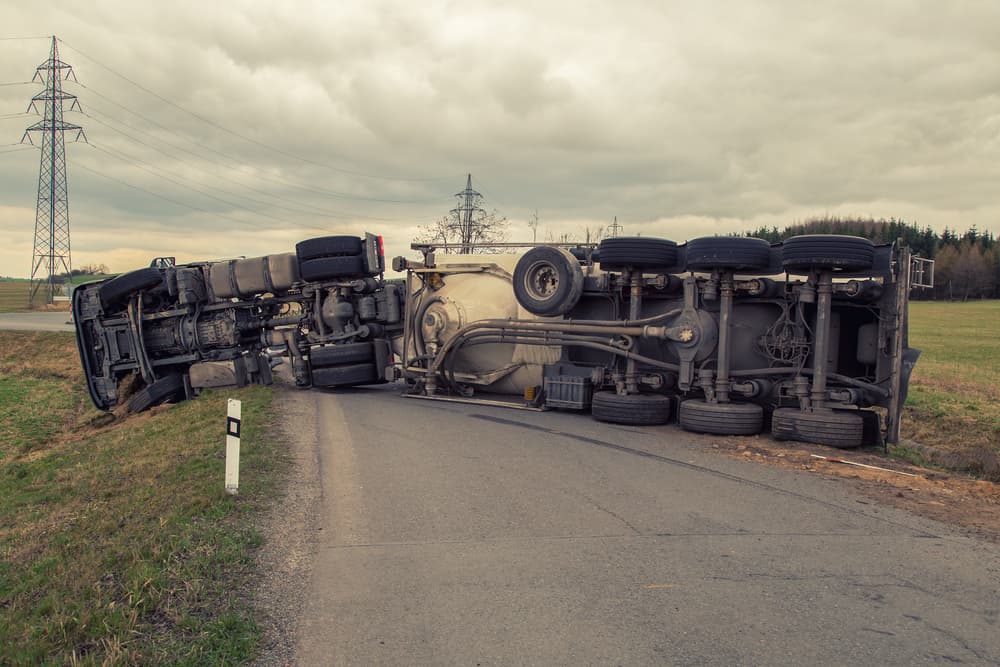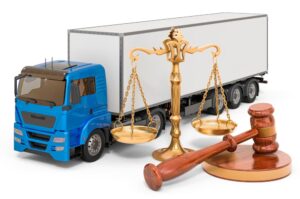In Austin, roads are often shared between personal vehicles and large commercial trucks. These giants literally drive the economy, transporting goods across the state and beyond. However, their size and operational demands also pose significant risks to road safety. In such cases you need a poor truck maintenance accident attorney in Austin.
Truck accident attorneys in Austin at DJC Law, understand the complexities and devastating impacts of truck accidents. Through our extensive experience, we've identified several key causes of these dangerous incidents, aiming to inform and protect our community. If you need professional Austin poor truck maintenance accident attorneys, we are here to help.
Causes of Truck Accidents
Here are some common reasons why truck accidents occur:

Driver Fatigue
One of the most common causes of truck accidents is driver fatigue. Despite regulations limiting driving hours, truckers often face immense pressure to meet tight delivery schedules. This can lead to extended hours behind the wheel, resulting in decreased reaction times and a higher risk of accidents. In such cases you need poor truck maintenance accident attorneys in Austin.
Improper Loading
The way a truck is loaded can significantly impact its stability and maneuverability. Overloading or unevenly distributing the cargo can cause the truck to tip over or make it difficult for the driver to control, especially on curves or when making sharp turns.
Mechanical Failures
Regular maintenance is crucial for the safety of any vehicle, more so for commercial trucks due to their size and the complexity of their operations. Mechanical failures, such as brake failures, tire blowouts, or steering issues, can lead to catastrophic accidents. Often, these incidents are preventable with proper vehicle upkeep.
Inadequate Training
Driving a commercial truck requires specialized skills and knowledge. Unfortunately, not all drivers receive the comprehensive training necessary to safely operate these vehicles. Inadequate training can fail to prepare drivers for certain conditions or how to respond to emergencies. Having poor truck maintenance accident attorneys in Austin can help you deal with such cases easily.
Distracted Driving
Distracted driving is a problem among all motorists, including truck drivers. Activities such as texting, using navigation systems, or even eating while driving can divert the driver's attention from the road, increasing the risk of an accident.
Poor Weather Conditions
Austin's weather, while generally mild, can present challenges such as heavy rain or fog, which significantly affect driving conditions. Large trucks are especially vulnerable to adverse weather due to their size and weight, making it difficult to stop quickly or maneuver safely.
Impaired Driving
Although it is less common, impaired driving due to alcohol or drug use is a serious issue that can lead to truck accidents. The effects of substances severely impair a driver's judgment, reaction times, and overall ability to drive safely.
What Can I Do If I Suffered Injuries in a Truck Accident?

Truck accidents are among the most catastrophic road incidents due to the sheer size and weight of commercial trucks compared to passenger vehicles. When a truck collides with a smaller vehicle, the physics involved can lead to severe, life-altering injuries for the occupants of the latter. During such incidents you might need Austin poor truck maintenance accident attorneys to help you resolve legal matters.
The impact of such a collision can cause traumatic brain injuries, spinal cord injuries, fractures, internal bleeding, and even death. These injuries often require extensive medical treatment, including surgeries, long-term rehabilitation, and continuous care, imposing significant financial, physical, and emotional burdens on the victims and their families.
The recovery process can be prolonged, sometimes lasting months or even years, and in many cases, the victims may never fully recover, leading to permanent disabilities.
Victims of truck accidents have the legal right to seek compensation for their injuries and losses through a truck accident claim against the truck driver and potentially other liable parties, such as the trucking company, cargo loaders, or vehicle manufacturers. Austin poor truck maintenance accident attorneys can help you better understand such matters and help resolve them quickly.
Successful truck accident claims require a thorough investigation, gathering of evidence, and expert legal representation to navigate the complex legal landscape and ensure that victims receive the justice and compensation they deserve. Your poor truck maintenance accident lawyer in Austin can help you deal with everything during this process.
What Compensation is Available to Truck Accident Victims?
Truck accident victims may be able to recover compensation for various damages, including:
- Medical Expenses: This covers all medical-related costs, from emergency room visits, hospital stays, surgeries, medication, rehabilitation, and therapy, to any future medical care required because of the accident.
- Lost Income: Compensation for earnings lost due to time off work for recovery. If the victim is unable to return to work or must switch to a lower-paying job because of their injuries, they may also be compensated for loss of earning capacity.
- Property Damage: If the victim's vehicle or personal property was damaged or destroyed in the accident, they could be reimbursed for repair or replacement costs.
- Pain and Suffering: This includes compensation for the physical pain and emotional distress experienced due to the accident and the resulting injuries.
- Loss of Enjoyment of Life: If the injuries prevent the victim from engaging in hobbies, sports, and other activities they once enjoyed, they may receive compensation for this loss.
- Emotional Distress: This covers psychological impacts such as anxiety, depression, PTSD, and loss of sleep resulting from the accident.
- Loss of Consortium: Compensation awarded to the spouse or family members of the victim for the loss of companionship, affection, and support.
Securing compensation following a truck accident can be complex, requiring a detailed understanding of the case's specifics and the applicable laws. Victims often benefit from the assistance of an experienced Austin poor truck maintenance accident attorney who can advocate on their behalf, ensuring they receive the maximum compensation possible.
Do I Have a Truck Accident Case?

In the context of personal injury law, negligence refers to the failure to exercise care toward others, which a reasonable or prudent person would do in the circumstances or taking actions that such a reasonable person would not.
Negligence is a fundamental concept in personal injury cases, including truck accidents, as it is often the basis for establishing liability and securing compensation for the injured party.
To have a successful truck accident case based on negligence, four key elements must be established:
- Duty of Care: The first element involves proving that the defendant (the party being sued) owed a duty of care to the plaintiff (the injured party). In truck accidents, this means demonstrating that the truck driver, trucking company, or another related party had a legal obligation to act in a manner that would prevent harm to others on the road. For example, truck drivers have a duty to follow traffic laws, and trucking companies have a duty to ensure their vehicles are properly maintained.
- Breach of Duty: Once a duty of care has been established, it must be shown that the defendant breached that duty through action or inaction. This could involve a truck driver operating a vehicle while fatigued, exceeding speed limits, or a trucking company failing to conduct necessary maintenance checks on their vehicles. The breach is essentially the failure to uphold the standard of care that a reasonably prudent person or entity would have in a similar situation.
- Causation: The third element is causation, which requires proving that the defendant's breach of duty directly caused the plaintiff's injuries. This means that the accident (and the resulting injuries) would not have occurred if it weren't for the defendant's negligent actions or failure to act. Causation can often be the most challenging part to prove, as it must be shown that the breach of duty directly led to the accident, without which the injuries would not have occurred.
- Damages: Finally, the plaintiff must demonstrate that they suffered actual damages as a result of the accident. Damages can be physical, such as bodily injuries, emotional, like pain and suffering, or financial, including medical bills and lost earnings. The plaintiff needs to provide evidence of these damages, which can include medical records, receipts, employment documents, and testimonies regarding pain and suffering.
Successfully establishing these four elements in a truck accident case can be complex, requiring thorough investigation and clear presentation of evidence that your poor truck maintenance accident lawyer in Austin can do for you.
Who Can You Hold Liable for a Truck Accident?

Determining liability in a truck accident involves navigating a complex web of relationships and responsibilities. Unlike accidents involving only personal vehicles, truck accidents can implicate several parties, each with varying degrees of accountability.
At DJC Law, we dissect these intricate scenarios to identify all potential sources of liability, ensuring our clients receive comprehensive legal representation. This is why we are considered as the best Austin poor truck maintenance accident lawyers. Here's an overview of who may be held liable in a truck accident:
The Truck Driver
The driver of the truck is often the first person you will scrutinize for liability. Distracted driving, fatigue, impairment by alcohol or drugs, or violations of traffic laws can directly lead to accidents. If the driver's negligence is found to be the cause, they can be held liable for damages. Hire a poor truck maintenance accident attorney in Austin for such legal matters.
The Trucking Company
Trucking companies can be held responsible for the actions of their employees through the legal doctrine of "respondeat superior," which holds employers liable for their employees' actions performed within the scope of their employment.
Moreover, if the company failed to adhere to safety regulations, such as hours of service laws, or neglected proper maintenance and training practices, you can hold it directly liable. Poor truck maintenance accident lawyers in Austin can help you understand these matters better.
The Cargo Loaders
Improperly loaded or secured cargo can cause accidents by shifting weight or falling off the truck. If the loading team, which might be a third-party contractor separate from the trucking company, fails to load the truck correctly, they can be held liable for any accidents resulting from their negligence.
The Truck or Parts Manufacturers
If a defect in the truck or any of its components contributes to an accident, the manufacturer of the vehicle or part can be held liable under product liability laws. This can include anything from faulty brakes to defective tires or malfunctioning steering systems.
Maintenance Companies
Some trucking companies outsource the maintenance of their vehicles to third parties. If an accident is caused by a failure to properly maintain the truck, and this duty was outsourced, the maintenance company may be held liable for any resulting damages. Poor truck maintenance accident lawyers in austin can guide you better on this.
Government Entities
In some cases, the condition of the road can be a contributing factor to a truck accident. If poor road maintenance, inadequate signage, or design flaws in the roadway played a role in the accident, you can hold a government entity responsible. However, suing a government body involves specific procedural rules and limitations, making it a more complex process.
Other Motorists
Finally, other drivers on the road can also contribute to or cause a truck accident. For example, if another motorist's reckless driving causes a truck driver to swerve and crash, that motorist could be held liable. In such cases you need the best Austin poor truck maintenance accident lawyers.
Contact a Poor Truck Maintenance Accident Lawyer in Austin You Can Trust

At DJC Law, we aim to ensure that our clients in Austin and the surrounding areas are fully compensated for their injuries and losses. If you or someone you know has been involved in a truck accident, don't navigate the complex legal landscape alone. Contact a Austin poor truck maintenance accident lawyer for the support and representation you deserve.
Remember, truck accidents can have devastating consequences, but you don't have to face the aftermath alone. Contact the personal injury lawyer at DJC Law today at (512) 888-9999 or through our online form for your free consultation and to discuss your legal options.